Mineral oil in hair care products has been a source of contention in the beauty and natural hair care sectors. It is critical to consider the facts and opposing viewpoints in order to uncover the truth. Mineral oil is a colorless, odorless, and tasteless petroleum fluid. Because of its capacity to lock in moisture and establish a barrier on the skin and hair, it is frequently used in a number of cosmetic and skincare products, including several hair care treatments. While it has benefits for moisture retention and scalp health, people should use products that are appropriate for their hair type and goals. A dermatologist or hair care professional can provide tailored advice for your specific hair care requirements.
Understanding Mineral Oil: What It Is and How It Affects Hair
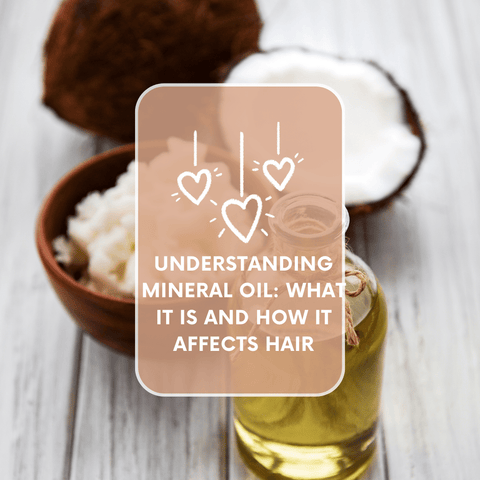
Mineral oil is a colorless, odorless, and tasteless oil obtained from petroleum, more precisely from crude oil distillation. It is a prevalent element in many cosmetic and skincare products, as well as several hair care products. This blog takes a closer look at mineral oil and how it affects hair. Its effectiveness is determined by individual hair types and preferences; thus, it is critical to choose items that meet your specific needs and goals. A dermatologist or hair care professional can provide customised advice for your hair care programme.
Decoding Mineral Oil: Exploring Its Properties and Composition
Mineral oil, commonly known as liquid paraffin or white oil, is a colorless, odorless, and clear oil created from petroleum, a naturally occurring substance found deep under the Earth's crust. Mineral oil has a wide range of industrial and cosmetic applications because of its unique qualities and composition, which include chemical composition, odorlessness and colorlessness, inertness and stability, viscosity, hydrophobic properties, emollient properties, non-comedogenic properties, and industrial uses. Mineral oil is frequently used in cosmetic and skincare products due to its ability to form a protective barrier, prevent moisture loss, and produce a smooth, non-greasy feel. However, its use has sparked debate in the cosmetics world, with some preferring natural or plant-based alternatives.
How Mineral Oil Impacts Hair: Separating Facts from Fiction
Mineral oil can have a variety of effects on hair, and it's critical to separate fact from fantasy when assessing its effects. Based on scientific understanding and common beliefs, here's a description of how mineral oil might affect hair in terms of moisture retention, shine, and smoothness; reduced frizz; compatibility; hair weight; hindered hair growth; scalp health; product choice; and preference for natural alternatives. It depends on your hair type and preferences as to whether it is suitable for you. Understanding how mineral oil affects your hair will allow you to make more informed decisions when purchasing hair care products.
The Relationship Between Mineral Oil and Scalp Health
The relationship between mineral oil and scalp health is complicated and depends on a variety of factors, including individual skin type, hair care practises, and the products utilised. Moisture retention, scalp problems, irritation and allergies, compatibility with hair products, personal preference, hair type, and patch testing are some significant aspects to consider when considering the impact of mineral oil on scalp health. Finally, the hair care and scalp care products you choose should be tailored to your personal needs and goals. If you have specific concerns about your scalp or hair, a dermatologist or hair care professional can offer tailored advice and recommendations.
The Controversy Surrounding Mineral Oil: Debunking Common Misconceptions
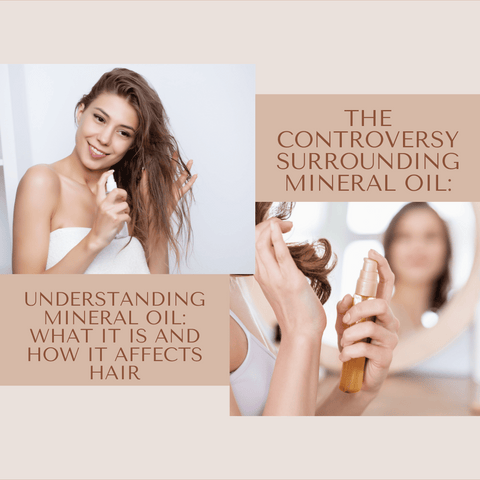
Mineral oil has been the source of debate and misinformation in the world of skincare and cosmetics. To provide a deeper knowledge of its role and safety, it is critical to clarify some of the following prevalent misconceptions:
-
Mineral Oil Is Harmful to the Skin: Reality: Cosmetic-grade mineral oil, which is used in skincare and beauty products, goes through rigorous purification and refinement processes to ensure its safety for human consumption. It is usually regarded as safe and well-tolerated when used topically by the majority of people.
-
Mineral Oil Causes Acne by Clogging Pores: Reality: Mineral oil is non-comedogenic, which means it is unlikely to clog pores or cause acne when applied to the skin. It is frequently used in skincare products due to its ability to lock in moisture while preventing acne breakouts.
-
Mineral oil obstructs skin breathing: Reality: While mineral oil forms a barrier on the skin's surface, it does not suffocate the skin or prevent it from "breathing." The skin's respiratory processes are not the same as those of the lungs. Instead, the barrier formed by mineral oil aids in the reduction of water loss and the preservation of hydration.
-
Mineral Oil Dries Out the Skin: Reality: Mineral oil is used as an emollient in skincare products, which means it softens and moisturises the skin. It does not dry out the skin when used appropriately. In fact, it can enhance skin hydration and prevent transepidermal water loss.
-
Natural Oils Are Always Superior to Mineral Oil: Reality: The effectiveness of skincare ingredients, including oils, varies depending on individual skin types and concerns. Natural oils have their benefits, but mineral oil can be a suitable and effective option for many individuals, especially those with dry or sensitive skin.
-
Mineral Oil Is Only Used in Low-Quality Products: Reality: Mineral oil is used in a wide range of skincare and beauty products, including those from reputable and high-quality brands. Its use is not exclusive to low-quality products, and it can be found in a variety of formulations.
-
Mineral Oil Blocks the Absorption of Other Ingredients: Reality: While mineral oil can form a barrier on the skin, it does not completely block the absorption of other ingredients. It can actually help enhance the penetration of certain active ingredients by creating a protective environment on the skin's surface.
-
Mineral Oil Is Harmful to the Environment: Reality: Mineral oil used in cosmetics is highly refined and does not pose significant environmental risks when used in personal care products. However, concerns about the environmental impact of petroleum-based products are related more to industrial use and production than cosmetic applications.
The Myth of Mineral Oil and Hair Damage: Expert Opinions
Mineral oil's use in hair care products has given rise to numerous myths and concerns, including the notion that it might cause hair damage. The dermatologist highlights that mineral oil can have various benefits for the hair when used in hair care products. It is well-known for its ability to seal in moisture and form a barrier on the hair shaft, which can be very beneficial for people who have dry or damaged hair. It helps to reduce water loss and can enhance overall moisture levels in the hair, resulting in smoother, shinier hair. Mineral oil, according to dermatology and hair care specialists, can have various benefits, including moisture retention, less frizz, and enhanced hair structure, when used in hair care products. Scientific evidence does not support claims that mineral oil causes hair damage or inhibits hair development. Individual preferences and compatibility are determined, as with any other hair care ingredient, by hair type and specific demands. If you have specific concerns about your hair and scalp, it's critical to choose products that correspond with your hair objectives and to visit a dermatologist or hair care professional.
Does Mineral Oil Promote or Inhibit Hair Growth? Expert Insights
The relationship between mineral oil and hair growth has been debated, and professional opinions might help explain the situation. Mineral oil, according to the physician and hair expert, is not known to either encourage or inhibit hair growth. Hereditary factors, hormones, and hair follicle health all play a role in hair development. Maintaining a healthy scalp and hair, on the other hand, may indirectly promote the conditions necessary for maximum hair development. Mineral oil-based products may indirectly contribute to a healthier environment for hair growth if they help to moisturise and soothe the scalp.
They talk about the significance of scalp health in supporting hair development. A dry or irritated scalp might potentially impede hair development or contribute to hair loss. Mineral oil-based products may help in this situation by moisturising and relaxing the scalp, thereby producing a more favorable environment for hair development. Mineral oil, on the other hand, has little direct effect on hair development. It is possible to indirectly support an environment favorable to hair growth by maintaining a healthy scalp and hair through appropriate moisturization and care. If you are worried about hair growth, it is best to take a holistic approach that focuses on a healthy diet, good hair care, and treating any underlying medical conditions under a doctor's supervision.
Styling Concerns: Can Mineral Oil Benefit or Harm Your Hair?
Mineral oil can have both benefits and potential drawbacks when used in hair styling products. It's important to consider your specific hair type and styling needs when evaluating the impact of mineral oil on your hair:
-
Mineral oil benefits hair styling by retaining moisture, reducing frizz, adding shine and smoothness, and providing thermal protection.
-
Mineral oil's potential drawbacks in hair styling include weight and greasiness, buildup and residue, incompatibility with certain styles, and individual sensitivities.
Mineral oil can help your hair by retaining moisture, decreasing frizz, and increasing shine. It may not be ideal for all hair types and styling preferences, however, because it might weigh down the hair and cause product accumulation. It's critical to evaluate your unique hair needs, the style you wish to achieve, and any potential sensitivities or reactions while utilising mineral oil-based hair styling products. Experimenting with various products and formulations will assist you in determining the ideal fit for your hair styling routine.
Assessing the Benefits and Drawbacks of Mineral Oil in Hair Care
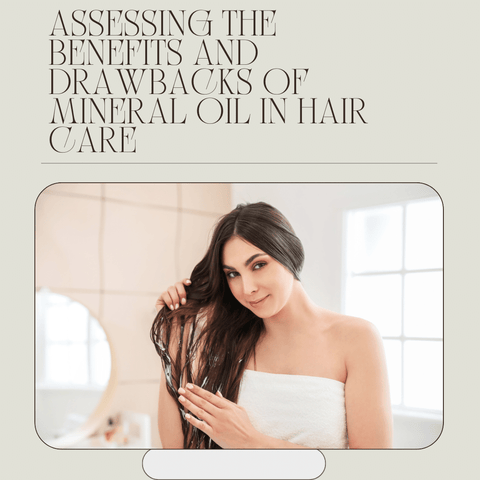
Mineral oil is a common ingredient in hair care products, and it has both advantages and disadvantages. Here's a look at how it affects hair care:
Mineral Oil Has Many Advantages in Hair Care:
-
Moisture Retention: Mineral oil is an effective occlusive agent, which means it forms a barrier on the hair shaft to help lock in moisture. This is especially beneficial for people who have dry or damaged hair because it can increase overall moisture levels and prevent further dehydration.
-
Reduced Frizz: Mineral oil's barrier can help reduce frizz by preventing external humidity from entering the hair shaft. This can make hair smoother and less frizzy, especially in humid conditions.
-
Shine and Smoothness: Mineral oil can give hair a glossy shine and a smoother texture, making it appear healthier and more manageable.
-
Detangling: Mineral oil-containing products can make detangling easier by reducing friction and increasing slip, which can be beneficial for people with knotty or tangled hair.
-
Scalp Health: Mineral oil-based products can be used to soothe and moisturise the scalp, making them useful for people who have dry or flaky scalps or other scalp conditions.
Mineral oil has the following drawbacks in hair care:
-
Weighing Down Fine Hair: Mineral oil-based products can make fine or thin hair appear greasy and limp. Mineral oil-based products can weigh down fine or thin hair, making it appear greasy and limp. This may not be suitable for those looking to achieve volume and lift.
-
Product Buildup: The use of mineral oil-based products over time can result in product buildup on the hair and scalp, resulting in dullness and the need for frequent cleansing to remove residue.
-
Incompatibility with Certain Styles: The weight and texture of mineral oil-based products may not be ideal depending on the desired hairstyle. These products may not produce the desired results for styles that require volume and hold.
-
Sensitivities and Allergies: While mineral oil is generally well-tolerated, some people may experience scalp irritation or sensitivity when using mineral oil-based products. A patch test can aid in the detection of any adverse reactions.
-
Concerns about the environment: Some people are concerned about the environmental impact of petroleum-based products such as mineral oil, particularly in terms of production and disposal.
Moisture Retention: Exploring Mineral Oil's Hydrating Properties
Mineral oil is well-known for its moisture-retaining characteristics, which make it an important ingredient in a variety of skincare and hair care products. Here's a look at how mineral oil can aid with moisture retention in a variety of ways, including barrier building, lowering transepidermal water loss (TEWL), locking in moisture, soothing and protecting, compatibility with other products, and non-comedogenic and scalp health. While mineral oil is efficient in retaining moisture, it is crucial to use mineral oil-containing products sparingly and as part of a well-balanced skincare or hair care routine. Some people may feel that mineral oil-based products are too heavy for their skin or hair, so it's critical to select products that are tailored to your personal requirements and preferences. Additionally, conducting patch testing when experimenting with new products can be beneficial. Additionally, when trying new products, patch tests can help identify any potential sensitivities or adverse reactions.
Protection Against Heat Damage: Does Mineral Oil Provide Adequate Shielding?
Mineral oil can provide some level of protection against heat damage when used in hair care products, but it may not be as effective as specialised heat protectants designed for this specific purpose. Take into account the following when using mineral oil as heat protection:
-
Limited Heat Protection: Mineral oil can protect against heat damage to some extent, but it might not offer the same level of protection as products made specifically to withstand heat. The purpose of heat protectants is to shield the hair from the high temperatures produced by styling tools. They frequently include extra ingredients to increase protection.
-
Product Selection: If you decide to use mineral oil-based products for heat protection, make sure they are specifically designed for this purpose. To provide more effective shielding, these products typically contain mineral oil in combination with other heat-protective ingredients.
-
Hair Type and Styling Habits: The effectiveness of mineral oil-based heat protection varies according to hair type, heat styling tools used, and frequency of styling. Heat protection requirements for fine or thin hair may differ from those for thick or coarse hair.
-
Additional Precautions: Regardless of the heat protection product you use, it is critical to use heat styling tools at the proper temperature and avoid excessive heat exposure to minimise damage. Keeping a safe distance between the tool and the hair, using lower heat settings when possible, and limiting heat styling frequency can all help protect the hair.
Product Build-Up and Hair Porosity: How Does Mineral Oil Contribute?
Mineral oil can contribute to product buildup in the hair, and its effect on hair porosity is dependent on a number of circumstances. Here are some examples of how mineral oil might affect product build-up and interact with hair porosity:
-
Product Build-Up: Mineral oil, when used in hair care products, can build up on the hair over time. Mineral oil produces a barrier on the hair shaft, trapping other products, oils, and debris. As a result, the hair may feel heavy, oily, and less receptive to styling.
-
Interaction with Hair Porosity: Hair porosity refers to the ability of the hair to absorb and retain moisture. There are three major types: low porosity, normal porosity, and high porosity. Mineral oil can worsen product build-up in people with low porosity hair, which has a strongly closed cuticle layer. Mineral oil may not penetrate efficiently due to the already resistant cuticle layer, making it more likely to sit on the hair's surface and accumulate other substances.
-
Use in Hair Care Products: The amount of mineral oil in hair care products and how frequently they are used both affect how much mineral oil contributes to product build-up. The use of mineral oil-based products on a regular or heavy basis can increase the probability of build-up.
Expert Recommendations: How to Incorporate Mineral Oil in Your Hair Routine
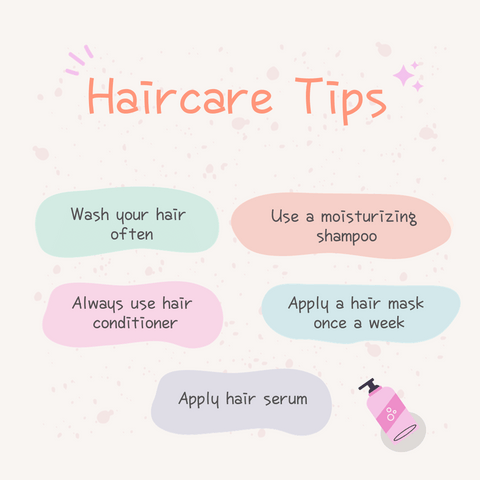
Mineral oil incorporation into your hair care routine necessitates careful consideration of your hair type, concerns, and product selection. Here are some expert tips on how to accomplish it effectively:
-
Choose the Right Products: Choose mineral oil-containing hair care products that are tailored to your hair type and demands. Mineral oil-containing shampoos, conditioners, hair serums, and hair masks fall into this category.
-
Patch Test: Perform a patch test before using any new mineral oil-containing hair care product. Apply a small amount of the product to a hidden region of your hair or scalp and wait 24-48 hours for any signs of irritation or sensitivity.
-
Balanced Usage: Mineral oil-based products should be used sparingly. Avoid using heavy products on your hair, especially if you have fine or thin hair, since this can lead to product build-up.
-
Apply to Ends and Lengths: Mineral oil-based treatments should be applied to the lengths and ends of your hair rather than the scalp. This can aid in the prevention of severe greasiness on the scalp.
-
Comb Through: Use a wide-toothed comb to distribute mineral oil-based treatments evenly through your hair after applying them. This ensures even distribution of the product and helps to prevent uneven application.
-
Avoid Heat Damage: Consider applying a heat protectant spray in addition to mineral oil-based products when using heat styling equipment to provide full heat damage protection.
-
Regular Cleansing: Include frequent cleansing in your hair care regimen. To keep your hair clean and manageable, use a clarifying shampoo or a sulfate-free shampoo to remove product build-up.
-
Assess Your Hair Porosity: To further personalise your use of mineral oil-based products, determine the porosity degree of your hair (low, normal, or high). To prevent build-up, hair with low porosity may require less frequent application or dilution.
-
Hydrate and Condition: Mineral oil can help lock in moisture and improve the overall condition of dry or damaged hair. Incorporate mineral oil-containing moisturising and conditioning products into your routine for further benefit.
-
Consult with a Professional: If you have specific hair concerns or conditions, talk to a doctor or a professional hairstylist about using mineral oil in your hair care routine.
Choosing the Right Products: Understanding Mineral Oil in Hair Care Labels
Understanding product labels and the presence of mineral oil in hair care products is critical for making informed decisions. Here's how to read labels and choose the proper products: search for mineral oil, concentration, product purpose, hair type and needs, additional ingredients, label claims, allergies, and sensitivities, consult reviews and recommendations, and patch test. Consider your hair's individual qualities and seek personalised product advice from professionals or reliable sources.
Tips for Using Mineral Oil-Based Products for Optimal Results
Effective use of mineral oil-based products can lead to optimal results in hair care and skincare routines. Here are some tips for using these products:
-
Start with Clean Hair or Skin: Before using mineral oil-based products, make sure your hair and skin are clean. Cleaning removes any existing product residue, making the mineral oil more effective.
-
Apply to wet hair or skin as follows: Mineral oil-based products should be applied to damp hair or skin for maximum absorption. Damp hair and skin are more permeable to the product.
-
Concentrate on Ends and Lengths: When applying to hair, focus on the lengths and ends, where they are most needed. Applying it directly to the scalp is not recommended, especially if you have fine or oily hair, as it can make your scalp appear greasy.
-
Use a Minimal Amount: When it comes to mineral oil-based products, a little goes a long way. Begin with a small amount and gradually increase as needed to avoid over-saturating your hair or skin.
-
Make an even distribution: Make sure the product is evenly distributed by combing or brushing it through your hair or gently massaging it into your skin. This ensures that the mineral oil is distributed evenly and effectively.
-
Consider Dilution: If mineral oil-based products are too heavy for your hair or skin, dilute them with water or a lighter product to reduce their concentration.
-
Use as Needed: Use mineral oil-based products as needed. They can be used as part of your daily routine or less frequently, depending on the needs of your hair or skin.
-
Combine with Other Products: Mineral oil-based products can complement other products well. For added moisture and shine, use a leave-in conditioner or styling product containing mineral oil.
-
Avoid Using Excessive Heat When Styling: If you use mineral oil-based heat protection products, you must still avoid excessive heat styling and use heat styling tools at appropriate temperatures to avoid damage.
-
Monitor for Sensitivity: When using mineral oil-based products, keep an eye out for any signs of sensitivity or irritation. If you have any negative reactions, stop using the product and consult a doctor.
-
Regular Cleansing: Incorporate regular cleansing into your routine to prevent product buildup on your hair or skin. If necessary, use clarifying shampoos or cleansers.
-
Adapt Usage to Your Hair Type: Adapt the use of mineral oil-based products to your unique hair type and needs. Fine or oily hair may need less frequent application, whereas dry or damaged hair may require more frequent application.
Keep in mind that the efficacy of mineral oil-based products can vary depending on your specific hair or skin type and concerns. Experimentation and consistency in your routine will assist you in determining the best way to use these products for the results you seek.
Exploring Alternatives: Other Ingredients for Hair Health and Hydration
There are several natural and synthetic ingredients that can provide similar benefits to mineral oil in terms of hair health and hydration. Here are some alternatives to think about:
-
Argan Oil: Argan oil is a lightweight and nourishing oil that is high in antioxidants, vitamins, and fatty acids. It moisturises and conditions the hair, making it softer and more manageable.
-
Coconut Oil: Coconut oil has moisturising properties. It has the ability to penetrate the hair shaft, thereby preventing protein loss and improving hair strength and elasticity.
-
Shea Butter: Shea butter is a natural emollient that promotes softness and moisture retention in both hair and skin. It is high in vitamins and fatty acids, so it is ideal for dry or damaged hair.
-
Jojoba Oil: Jojoba oil is a light oil that is similar to the natural oils produced by the scalp. It promotes a healthier scalp environment by balancing oil production, moisturising the hair and scalp, and moisturising the hair and scalp.
-
Aloe Vera: Aloe vera is a hydrating and soothing ingredient that can be used in hair care products or on its own. It can help soothe scalp irritation while also increasing hair moisture.
-
Glycerin: A humectant, glycerin attracts and retains moisture in the hair. It is frequently used to improve hydration in leave-in conditioners and hair sprays.
-
Hyaluronic Acid: A hydrating ingredient, hyaluronic acid can hold 1,000 times its weight in water. It is becoming more common in hair care products to provide deep hydration.
-
Protein-Based Ingredients: Hydrolyzed keratin and silk protein, for example, can help strengthen hair and improve moisture retention.
-
Natural Oil Blends: Some hair care products contain a blend of natural oils, such as argan, jojoba, and coconut oils, to provide a variety of benefits.
-
Silicones: Silicones are synthetic ingredients that can help smooth and condition hair by creating a barrier that locks in moisture and reduces frizz.
If you want to avoid mineral oil, look for hair care products that contain these alternative ingredients. Keep in mind that the effectiveness of these ingredients will vary depending on your hair type and specific needs. It may take some trial and error to find the right products and routines for your hair's health and hydration.
The Final Verdict: Expert Insights on Mineral Oil and Its Impact on Hair
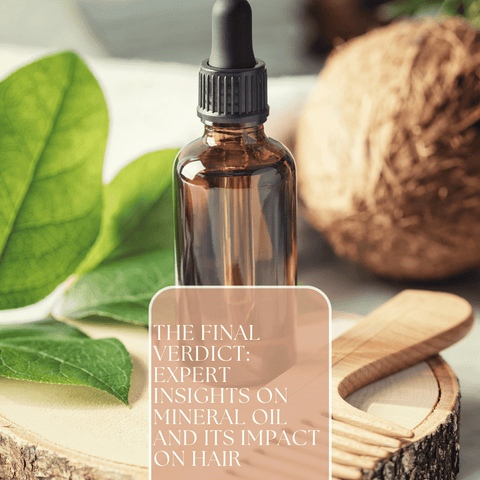
Mineral oil, according to dermatological and hair care specialists, can offer a variety of benefits when used in hair care products, including moisture retention, decreased frizz, and improved hair structure. Scientific evidence does not support claims that mineral oil causes hair damage or inhibits hair development. Individual preferences and suitability are determined by hair type and personal requirements. If you have specific concerns about your hair and scalp, it is vital that you use products that are appropriate for your hair goals and consult with a dermatologist or hair care professional. Finally, because the effect of mineral oil on hair differs from person to person, choosing the right products and routines is crucial to having healthy, moisturised hair.
































